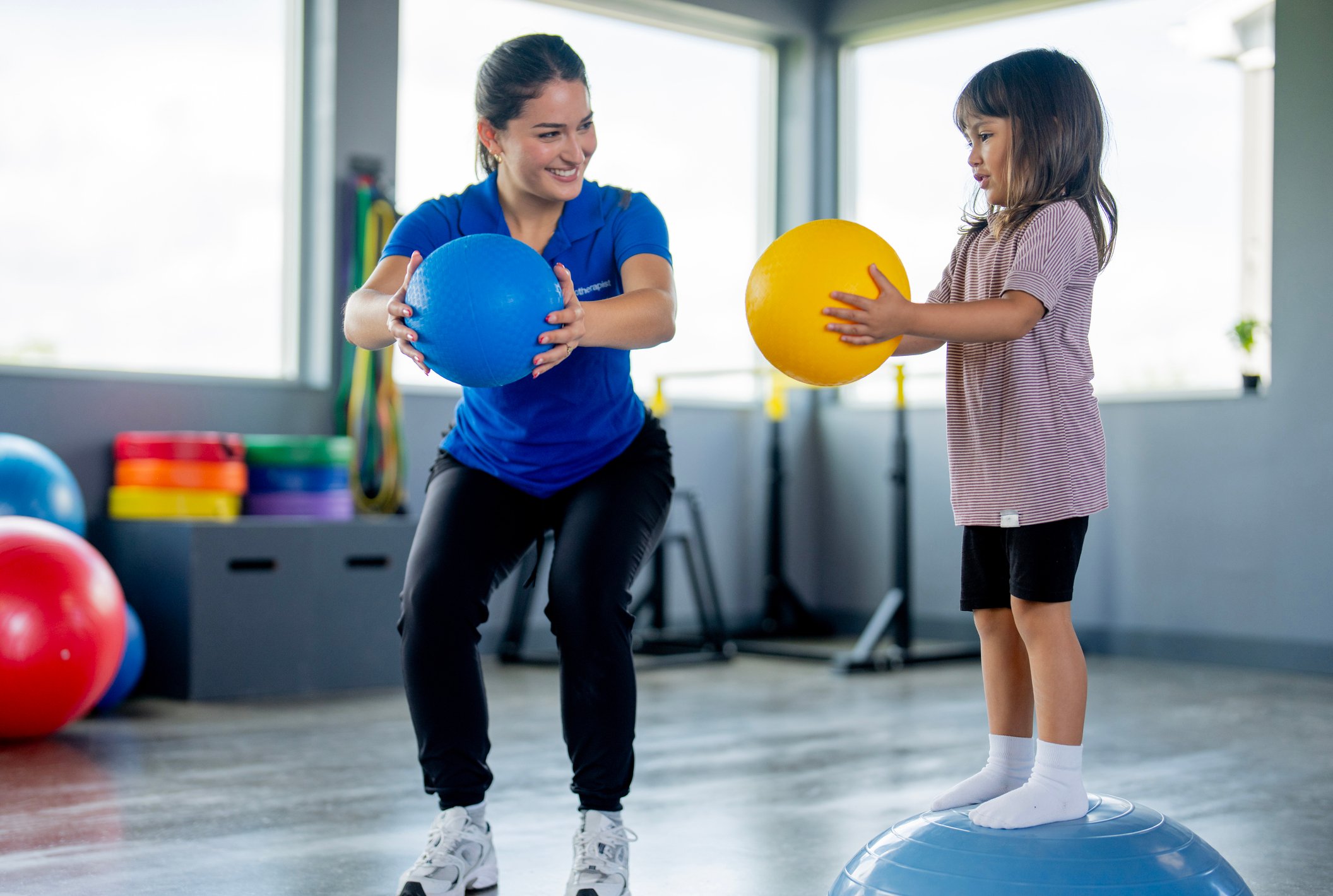From almost the very first day, newborn babies are moving their tiny bodies in ways that develop the large muscles in the back, neck and chest. When they hold up their head or learn to roll over, they are building strength and coordination. With every improvement—sitting up, crawling or cruising along the furniture—they are meeting important development milestones. If there are any delays in achieving these goals, pediatric physical therapy is there to help.
What Is Gross Motor Development?
Gross motor development refers to a child’s ability to move and control the large muscle groups in their legs, arms, and torso. These muscles provide the strength to enable them to crawl, walk, run, jump, kick and climb. As they master the skill of controlling these muscles, children have a greater ability to ride bicycles and play games at the park or in school.
Certain health conditions can slow down or impair gross motor development. But with the right help, children affected by these conditions can make great improvements. Physical therapy can increase their independence and ability to care for themselves as well as improve their mobility and enjoyment of play with other children.
Health Conditions That Benefit from Physical Therapy
Children with conditions affecting the brain and nervous system or that weaken muscles can benefit greatly from care by pediatric physical therapists. These conditions include:
- Cerebral palsy
- Spina bifida
- Muscular dystrophy
- Hypotonia (low muscle tone)
- Down syndrome
- Premature birth
With gentle guidance in an encouraging, relaxed atmosphere, pediatric physical therapists can guide and assist children with these conditions as they gain better balance, coordination and strength.
Some children without any diagnosed health conditions may also need extra support and motivation to achieve their developmental milestones. Whatever the need, pediatric physical therapists have the skills!
Gross Motor Developmental Milestones to Watch For
If you’re raising a little one, here are some of the major milestones to note as they gain mobility and strength.
First Year
- Three months: Lifts head while lying on tummy
- Four to six months: Rolls over
- Six to eight months: Sits without support
- Seven to ten months: Crawls
- Nine to 12 months: Cruises along furniture
Years One to Three
- 12 to 15 months: Stands and walks
- 18 to 24 months: Runs
- 24 to 30 months: Climbs on furniture
- Two years: Kicks a ball
- Three years: Pedals a tricycle
Three to Five Years
- Runs with more coordination
- Walks up and down stairs, alternating feet
- Throws and catches balls
What Can Happen if These Skills Are Delayed?
Children lacking these skills may fall more often, tire easily or avoid active games with other children. They may begin to struggle with confidence and self-esteem if they can’t keep up with others. When they start in school, organized games or gym classes may present real challenges. Other students or even teachers may misunderstand their unwillingness to participate.
The good news is that pediatric physical therapy helps many children gain the strength and ability to participate fully. If a neurological or other condition is present, pediatric PT can help children develop their optimum strength, mobility, balance and independence.
How Pediatric Physical Therapy Improves Gross Motor Skills
Fortunately, gross motor skills are involved in so many active games that children play! Physical therapists keep children motivated and engaged by designing strengthening and balance-improving activities that feel like games.
For babies learning to crawl, they may be encouraged to scoot forward until they can claim a toy they like—with cheers from the therapist! Preschoolers may be engaged in obstacle courses with soft ladders, platforms and slides to be conquered. At the end is a big pit of soft foam to jump into! Older kids can build skills riding bikes or throwing and catching balls, all in carefully planned stages. Whatever the activity, pediatric PTs know how to keep the atmosphere fun, light and winning.
Physical Therapy Builds Motor Skills Along with Confidence
As each child makes progress toward their own achievable goals, confidence and enjoyment of play also increase. If you have concerns about your child’s gross motor skill development, ask for an evaluation. In a short time, you can learn if pediatric physical therapy can help your child achieve their fullest potential. Call Let’s Communicate at (678) 963-0694 to schedule an evaluation today.


